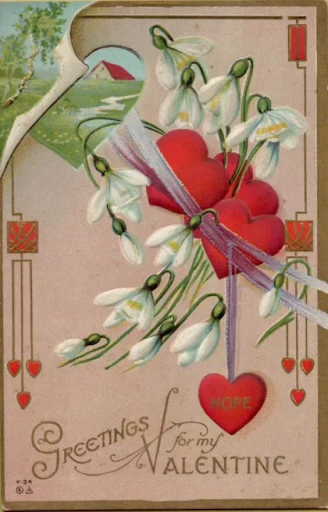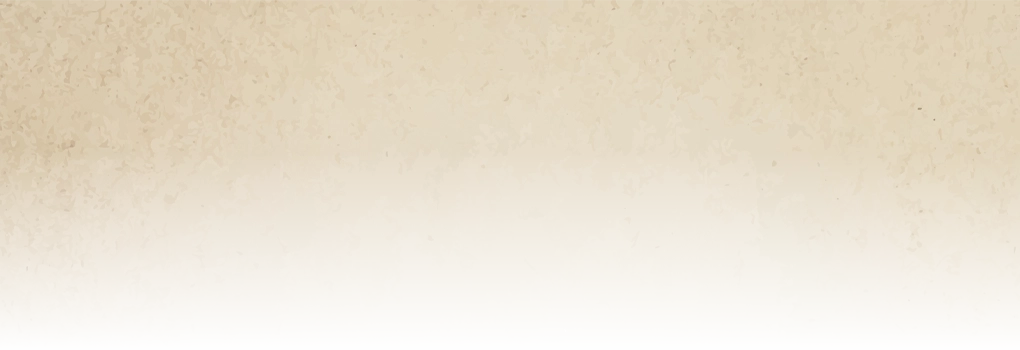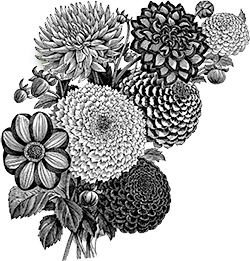To read more by topic or date, see our Newsletter Archives page.
February 8, 2024
“As far as I’m concerned, …[tulips] are the best, indeed the only flowers to send or receive on Valentine’s Day. Wild, irrepressible, wayward, unpredictable, strange, subtle, generous, elegant, tulips are everything you would wish for in a lover. Best of all are the crazy parrot tulips such as ‘Rococo’ with red and pink petals feathered and flamed in crinkly lime-green. ‘When a young man presents a tulip to his mistress,’ wrote Sir John Chardin (Travels in Persia, 1686), ‘he gives her to understand by the general red color of the flower that he is on fire with her beauty, and by the black base that his heart is burned to coal.’ That’s the way to do it.”
– Anna Pavord, wonderful British garden writer and bulb lover, in The Curious Gardener: A Year in the Garden, 2010
Cupid Says, “Surprise Your Valentine with Heirloom Bulbs!”

|
Candy is bad for your teeth and cut-flowers won’t last, but every gardener on your list will love our gorgeous, time-tested bulbs. Our dreamy gift-certificates are easy to give and fun to use. Or you can choose from customized lists of pink, red, or fragrant heirlooms by using our awesome Advanced Bulb Search. Or how about sending a few ‘My Love’ and ‘Fascination’ dahlias, ‘Wine and Roses’ gladiolus, or . . . well, you get the picture. Order them now and we’ll deliver them at planting time in April.
Don’t forget to give yourself a little love, too. It’s not just your sweetie, Mom or Dad, and garden friends who deserve an abundance of beauty. Happy Valentine’s Day!
Daylilies for the South
Inspired by last month’s article on daylily breeder Dr. A. B. Stout, our good customer David Allen wrote to us about his experiences growing daylilies in Friendswood, Texas. His zone 9b garden is warmer than we’d expect daylilies to thrive, and we thought we’d pass along his results, especially for those of you in areas where spring is coming soon! David reports, “Three or four years ago I ordered from you (and others) many daylilies, trying to go back to the earliest hybrids for strongest plants to combat the intense heat and humidity and at time freezes as low as seven degrees Fahrenheit (Dec. 22, 1989). Most daylily hybrids fail here.” While he lost some to summer drought and others were weakened by a February freeze coming after active growth had begun, some varieties excelled for him. While we probably will keep our zone recommendations conservative, if you’ve been wanting to experiment with daylilies, here are some of his favorites.
‘Caballero’ is “the most beautiful grower and flower I got from you” which can outlast “freeze and heat and drought and take high humidity without mildew.” He also recommends ‘Mikado’ and ‘Challenger’ and says that ‘Hyperion’ was “very hardy to all this and beautiful. ‘Salmon Sheen’ was vigorous, despite other pinks performing poorly for him. “Finally,” he says, “from the hand of Bertrand Farr, who died young in the 1920s but his firm as mentioned in your email article of 07Jan2024 did most of the introducing of Stout hybrids to the world, I highly recommend Farr’s hybrid, ‘Ophir’ which takes all heat and humidity and freezes and multiplies wonderfully and flowers over [a] very long season.”
Since we offer different daylilies in rotation over several years, not all of David’s favorites are available this spring, but you can sign up for an email alert on any that you’d like to try in the future.
Hurray (and, perhaps, Hurry): Many Fall-Planted Varieties are Now Available!

|

|

|
| ‘Croesus’ daffodil | ‘Mariette’ tulip | ‘Minos’ hyacinth |

|

|

|
| ‘Jeanne d’Arc’ crocus | ‘African Queen’ lily | ‘Edulis Superba’ peony |
We wanted our newsletter subscribers to be among the first to know that our heirloom daffodils, the backbone of most spring gardens, colorful tulips (note that most Hortus bulborum bulbs are available in limited quantities), fragrant hyacinths, cheerful crocus, lilies, peonies and other treasures, many tolerant of light shade, have just been made available to purchase for October shipping. If there’s a particular variety you missed last year, this is your chance to order before it sells out - and you can always add to your fall order once you see how beautifully the bulbs you planted last year are blooming. If there’s just a variety or two, drop us an email letting us know how many of which varieties you’d like; otherwise, place a second order with a note that you’d like it combined with your existing one. You save on shipping, we use less packaging – it’s a win-win!
Exploring the Scents of Extinct Flowers Through Biotechnology

|
As people who love flowers and work to keep our favorites from commercial extinction, we’ve been fascinated by the launch of a start-up beauty company offering perfumes inspired by the fragrances of extinct flowering plants. The CEO of Arcaea, Jasmina Aganovic, is an MIT-trained chemical engineer who is using the products cutting-edge biotechnology to bring new ideas and processes to the beauty industry.
The story begins in the laboratories of Ginkgo Bioworks, founded by MIT synthetic-biology graduates, which specializes in designing microbes which will produce particular molecules such as flavorings or pharmaceuticals valuable to various industries. In this case, DNA was extracted from fragments of plant specimens preserved in the Harvard University Herbarium. It was sequenced and genes identified that were likely involved with fragrance-producing molecules. The genetic code was inserted into yeast to produce quantities enough for noses, both human and mechanical, to detect. Aganovic then worked with master perfumers from around the world to formulate the six fragrance blends that are currently available. As she explained in a recent Forbes interview, we may never know exactly what these extinct flowers smelled like, but we can catch some of their essence. “I want to be very clear about the potential, and also the limitations of this—we're never actually going to know what these flowers smelled like,” Aganovic says. “This is just a starting piece of data that gives us a little bit of a glimpse. It's not going to be able to tell us everything.”
Always willing to do our own research, we bought one of their sampler sets to try for ourselves. All 6 scents were pleasing but each distinct enough for favorites to emerge. Rita liked Jerome Epinette’s ‘Floating Forest’ best, which the company describes as “A cooling, watery overture is awakened by a pinch of black pepper and vibrant bergamot, softened by a floral heart, and grounded by the soothing scent of earthy woods, salted musk, and wet stones.” It was inspired by a tree endemic to Borneo, Shorea cuspidata, which hasn’t been seen in the wild since 1998 and probably lost to logging. It was also a standout for editors at Harper’s Bazaar who raved “Just the idea of extinct flower sequencing is thrilling, but the experience of actually smelling each of Future Society’s scents cements the brand as one of the most exciting new launches in recent memory. The fragrances are not only wearable, but also refreshingly unique. It’s as if your brain can’t pick out one particular note with each sniff, because the scents smell like something you’ve never known.”
Vanessa’s favorite, ‘Invisible Woods’, is based on Wendlandia angustifolia, a species of small flowering trees from India’s Western Ghat mountains, last recorded in 1917 and likely a victim of drought. From perfumer Daneila Andrier, it’s described as “Invigorating grapefruit and ginger are met by the calming embrace of eucalyptus, chamomile, and rose absolute– grounded by a natural, woody base.” Amelia says the due to “midwestern sentimentality” she chose “Grassland Opera”, based on Orbexilum stipulatum which flowered on Rock Island in the Falls of the Ohio River back in the mid-19th century. It was another Harper’s standout and its designer Olivia Jan explained that since the “flower grew near a waterfall, … I tried to make something wet, green, and lush.”
For lots more on the story of the recovery and sequencing of DNA from these extinct plants, read this lyrical Scientific American article and listen to Aganovic’s TedXTalk to hear her ideas on using biotechnology to create a sustainable future for the beauty industry.
Share Our Gazette with a Friend
Please help us “Save the Bulbs!” by forwarding our newsletter to a kindred spirit, garden, museum, or group.
To Reprint Any Part of Our Gazette . . .
Simply credit www.oldhousegardens.com.














